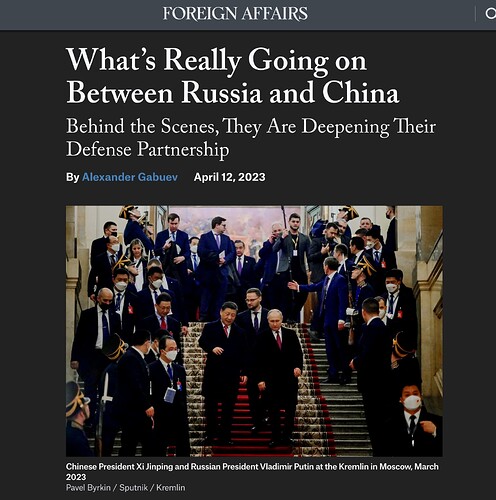-
习近平上个月对俄罗斯的访问表明了公众对这位陷入困境的俄罗斯领导人的支持。
-
习近平和普京就中俄国防合作的未来做出了一些重要决定,并很可能就武器交易达成了协议。
-
乌克兰战争和随之而来的西方对俄罗斯的制裁正在减少克里姆林宫的选择,并将俄罗斯对中国的经济和技术依赖推到前所未有的水平。
-
中国共产党的高层人士公开讨论了与俄罗斯建立更紧密伙伴关系的必要性,因为他们认为美国旨在遏制中国崛起的政策日益充满敌意。
-
习近平此行是为了表明中国在与俄罗斯的关系中看到了许多好处,它将继续保持这些最高级别的关系,而且它不会被西方的批评所吓倒。
-
中国提出了一份关于乌克兰危机的立场文件,这是一份冗长的谈话要点清单,作为习近平访问的门面装饰。
-
真正的行动发生在普京和习近平私下谈判的幕后。
-
两位领导人可能讨论了武器交易和国防合作问题。
-
中俄伙伴关系被视为两国对抗美国及其盟友的一种方式。
-
在行程结束时,克里姆林宫公布了一份由中国和俄罗斯双方签署的14份文件的清单,乍一看似乎是各部委之间无关紧要的备忘录。然而,当更仔细地观察时,出席会谈的许多官员都参与了俄罗斯的武器和太空项目。两国很可能在讨论更深入的国防合作。
-
中国和俄罗斯没有公开任何新的交易,但过去曾这样做。在美国国会于2017年通过《通过制裁反击美国对手法案》后,北京和莫斯科停止披露其军事合同。俄罗斯过去一直不愿意向中国出售尖端军事技术,但自从与西方国家关系破裂以来,这种情况已经改变。
-
自20世纪90年代以来,中国一直依赖俄罗斯的军事硬件,但现在拥有自己的军事工业。尽管如此,北京仍然希望获得俄罗斯的地对空导弹、战斗机发动机和水下作战设备技术。为了使自己的工业现代化,俄罗斯已经开始将其研究设施与中国伙伴整合,并向中国伙伴开放大学和科学研究所。
-
习近平-普京峰会讨论了俄罗斯公司如何更好地进入中国金融体系,以及扩大俄罗斯自然资源对中国的销售。北京没有兴趣吸引人们对此类交易的关注,因为中国有很多潜在的卖家,而俄罗斯的潜在买家很少。人民币正在成为俄罗斯贸易结算、储蓄和投资的首选货币,使中国成为俄罗斯越来越重要的合作伙伴。
-
北京仍然需要莫斯科,而克里姆林宫可以提供某些独特的资产:购买俄罗斯的先进武器和军事技术,更自由地获得俄罗斯的科学人才,以及俄罗斯丰富的自然资源禀赋。俄罗斯是一个反美大国,在联合国安理会拥有常任理事国席位,在美国与许多国家关系更密切的世界上,他们是中国的一个方便的朋友。
-
俄罗斯的规模和实力可能会让克里姆林宫在与北京的关系中产生一种虚假的安全感。这种关系的持久性将取决于中国管理一个不断削弱的俄罗斯的能力。在未来的几年里,普京政权必须学会如何向上管理,才能生存。
-
Xi Jinping’s last month visit to Russia was a demonstration of public support for the embattled Russian leader.
-
Xi and Putin made a number of important decisions about the future of Chinese-Russian defense cooperation and likely came to terms on arms deals.
-
The war in Ukraine and ensuing Western sanctions on Russia are reducing the Kremlin’s options and pushing Russia’s economic and technological dependence on China to unprecedented levels.
-
Senior figures in the Chinese Communist Party have openly discussed the need for a closer partnership with Russia because of what they perceive as an increasingly hostile U.S. policy aimed at containing China’s rise.
-
Xi’s trip was to show China sees many benefits in its relationship with Russia, it will continue to maintain those ties at the highest level, and it will not be deterred by Western critics.
-
China presented a position paper on the Ukrainian crisis, a laundry list of talking points, as window dressing for Xi’s visit.
-
The real action took place behind the scenes in private negotiations between Putin and Xi.
-
The two leaders likely discussed arms deals and cooperation for defense.
-
The Chinese-Russian partnership is seen as a way for both countries to push back against the U.S. and its allies.
-
At the conclusion of the trip, the Kremlin published a list of 14 documents signed by both China and Russia, which at first glance appeared to be insignificant memorandums between ministries. However, when looking more closely, many of the officials present at the talks were involved in Russia’s weapons and space programs. It is likely that the two countries were discussing deeper defense cooperation.
-
China and Russia have not made any new deals public, but have done this in the past. After the U.S. Congress passed the Countering America’s Adversaries Through Sanctions Act in 2017, Beijing and Moscow stopped disclosing their military contracts. Russia has been reluctant to sell cutting-edge military technology to China in the past, but since the breakdown in ties with the West, this has changed.
-
China has relied on Russian military hardware since the 1990s, but now has its own military industry. Nevertheless, Beijing still wants access to Russian technology for surface-to-air missiles, fighter jet engines, and underwater warfare equipment. To modernize its own industry, Russia has started integrating its research facilities with Chinese partners and opening up universities and science institutes to Chinese partners.
-
The Xi-Putin summit discussed how Russian companies could gain better access to the Chinese financial system and expanding the sale of Russian natural resources to China. Beijing has no interest in drawing attention to such deals, since China has many potential sellers, whereas Russia has few potential buyers. The yuan is becoming Russia’s preferred currency for trade settlement, savings, and investments, making China an increasingly important partner for Russia.
-
Beijing still needs Moscow and the Kremlin can provide certain unique assets: purchases of advanced Russian weapons and military technology, freer access to Russian scientific talent, and the rich endowment of Russia’s natural resources. Russia is an anti-American great power with a permanent seat on the UN Security Council, making them a convenient friend for China in a world where the United States has closer ties with many countries.
-
Russia’s size and power may give the Kremlin a false sense of security in their relationship with Beijing. The durability of this relationship will depend on China’s ability to manage a weakening Russia. In the years to come, Putin’s regime will have to learn how to manage upward in order to survive.
